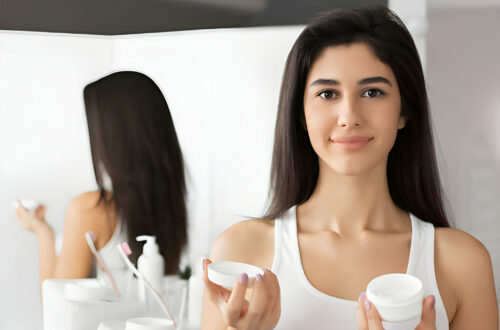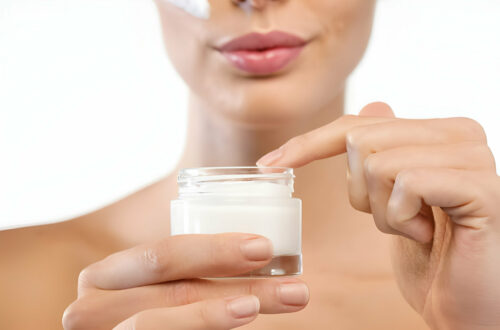The condition of our skin has a profound impact on our overall appearance. While makeup can temporarily conceal some features and accentuate others, our skin’s true condition becomes evident when the makeup is removed. This emphasizes the importance of proper self-care.
Traditional skincare products like moisturizers and sunscreens certainly play a significant role in nurturing the skin. However, many experts in the field of cosmetics and skincare advocate for a more comprehensive and holistic approach to skincare, incorporating natural products for skin care.
This article delves into the philosophy underpinning holistic skincare and elucidates why it often produces superior results compared to exclusively concentrating on superficial skincare.
Holistic Skin Care Explained
What Is Holistic Skin Care? Holistic skincare specialists maintain that the health of our skin is intricately connected to our physical, emotional, and mental well-being, not solely contingent on external influences such as environmental factors. They regard the skin as an integral part of the entire body, rather than a distinct entity.

Research has demonstrated that various skin issues, including acne, eczema, seborrhea, collagen depletion, and others, frequently manifest in response to stress, sleep deficiencies, medical conditions, and more. Holistic skincare encourages the use of gentle, natural topical skincare products alongside internal methods of nourishing and supporting the skin.
Components of Holistic Skincare
Holistic skincare practitioners take into account a patient’s dietary choices, physical health, stress levels, hormonal imbalances, and other health and lifestyle factors when crafting a personalized skincare regimen. They firmly believe that the skin serves as a reflection of our overall well-being and posit that achieving healthy skin requires a commitment to improving internal health.
Eating Well for Healthy Skin
The relationship between diet and skin health has been understood for centuries. A good diet includes foods that provide essential nutrients like proteins, fiber, healthy fats, vitamins, and minerals. A healthy digestive system can help prevent skin issues such as rosacea and acne.
To promote healthy skin, focus on foods rich in water, antioxidants, fiber, and vitamins. These can be found in fresh fruits and vegetables like dark leafy greens, berries, apples, watermelons, cucumbers, grapes, tomatoes, and nuts. Incorporating healthy fats like avocado and flaxseed can enhance your skin’s flexibility and elasticity. Additionally, integrating antioxidant skin care products can further protect your skin from environmental damage and support overall skin health.

On the flip side, overindulging in sugar, trans fats, fried foods, soft drinks, and alcohol can harm both your complexion and internal organs. For some individuals, dairy and certain foods can trigger acne. Skin problems can sometimes be linked to food intolerances, so holistic skincare experts might suggest food allergy tests.
“Stay Hydrated We’ve all heard it before: our bodies are mostly made up of water, around 60%. To keep our cells and organs, including our skin, functioning well, we need to stay properly hydrated. Doctors recommend drinking between eight and ten glasses of water daily. Drinking less can lead to dry, dull, saggy, and wrinkled skin. Incorporating glowing skin care practices can further enhance your skin’s radiance and hydration levels.
Stay Active Exercise for Healthy Skin Physical activity is the second key to good health. Regular exercise reduces stress and boosts the release of endorphins, the happy hormones. It also lowers the levels of the stress hormone cortisol, which can help with skin issues like acne, eczema, and oily skin.
Sweating and improved circulation from exercise help clear the skin, remove toxins, and provide skin cells with oxygen and nutrients, resulting in better skin.
Reduce Stress
The stress hormone cortisol can cause various health problems and skin issues such as inflammation, acne, eczema, seborrhea, and psoriasis. Managing stress can be tough, but it helps to engage in relaxation activities like meditation and yoga, use herbal remedies, and eat healthy foods.
Get Good Sleep -for Healthy Skin Many of us have experienced the effects of sleep deprivation, like dark circles, puffiness under our eyes, and lackluster, sagging skin. Disrupted sleep patterns can also increase cortisol, which can lead to skin inflammation and more severe problems.
If you struggle with getting at least seven hours of uninterrupted sleep at night, consider:
- Regular exercise
- Meditation
- Herbal teas like chamomile or nettle
- Natural supplements that reduce stress and improve sleep (e.g., Ashwagandha)
- A relaxing bath before bedtime
- Avoiding electronic devices at least two hours before bedtime

Choose Skin-Friendly Products Holistic skincare means using gentle products suitable for all skin types, including sensitive skin. Read product labels to steer clear of harsh ingredients like parabens, synthetic fragrances, and SLS. Opt for cleansers, serums, and moisturizers with natural ingredients like avocado, honey, aloe, and antioxidants like vitamins C, A, and E. Incorporating peptides in skin care will also nourish your skin and protect it from free radicals.
In Conclusion,Our skin shields us from external factors and reflects our inner well-being. If we neglect our health due to poor lifestyle habits, our skin will show dryness, sagging, and inflammation.
Holistic skincare promotes a balanced life and taking care of our bodies from the inside out. Beautiful, radiant skin is the natural outcome of these choices.





